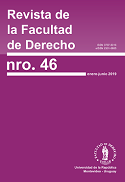When Women Raised Civil Equality
Importance and Proposals Around the VII International American Conference of Montevideo, 1933
DOI:
https://doi.org/10.22187/rfd2019n46a14Keywords:
Women, VII American Conference, Civil Rights, Equality, FeminismAbstract
The present article seeks to rescue the political, historical and diplomatic importance of the VII International American Conference held in Montevideo between December 3 and 26, 1933. The significance of this event stands out in making visible the diplomatic relations of the United States with America. Latina in the context of the convulsed thirties. On the other hand, it meant a fundamental event for the feminist movement and its demands for equality of political and civil rights. The objectives set are focused on the particular analysis of the claims presented by the women and their arguments regarding the equality of political and civil rights, in the justifications and recommendations arising from the Montevideo Conference of 1933. It seems interesting to look back at this event which, from the standpoint of demand, made visible a problem that affected women and that consolidated their relationship of subjection with respect to men. Even today, analyzing it in a current perspective, we ask ourselves if those claims do not remain in the agenda of political discussion.
Downloads
References
Álvarez Vignoli de Demicheli, S. (1934). Derechos civiles y políticos de la mujer. Montevideo: s. d.
Batalla, I. (2005). Política exterior de Uruguay, 1830–1895. Tendencias, problemas, actores y agenda. Documentos de Trabajo, (69).
Beyhaut, G. y H. (1995). América Latina. De la independencia a la segunda guerra mundial. México: Siglo XXI.
Boersner, D. (1996). Relaciones internacionales de América Latina. Breve historia. Venezuela: Editorial Nueva Sociedad.
Clemente, I. (2013). Uruguay en las conferencias panamericanas: la construcción de una opción en política exterior. Ponencia presentada al Simposio Los Asuntos Internacionales en América Latina y el Caribe Historia y Teoría. Problemas a Dos Siglos de la Emancipación. Recuperado de http://cienciassociales.edu.uy/wp-content/uploads/sites/6/2013/archivos/Ponencia_Uruguay-Panamericanismo.pdf
Giordano, V. (2014). De “ciudadanas incapaces” a sujetos de “igualdad de derechos”. Las transformaciones de los derechos civiles de las mujeres y del matrimonio en Argentina. Revista Sociedad, (33).
Jacob, R. (2016). Las inversiones norteamericanas 1900-1945, Montevideo: Objeto Directo ediciones.
Jacob, R. y Caetano, G. (1991). El nacimiento del Terrismo, 3 tomos. Montevideo: Ediciones de la Banda Oriental.
Luisi, P. (1921). Estatutos. Alianza Uruguaya para el Sufragio Femenino. Montevideo: s.d.
Machado Bonet, O. (1969). Sufragistas y poetisas. Enciclopedia uruguaya, (38).
Morgenfeld, L. (2009). Argentina frente a Estados Unidos en las conferencias panamericanas. Recuperado de http://repositorio.filo.uba.ar/handle/filodigital/1298
Naciones Unidas (junio 2003). La mujer, la nacionalidad y la ciudadanía, La mujer en el 2000 y después. Recuperado de http://www.un.org/womenwatch/daw/public/jun03s.pdf
Osta Vázquez, M. L. (2011). Vidas que se cruzam: as trajetórias das feministas sufragistas uruguaias e brasileiras através dos discursos. Anais do Seminario de Historia do Tempo Presente. Florianópolis: UDESC.
Osta Vázquez, M. L. (2012) Feminismo, Eugenia e Maternalismo nos discursos de duas feministas sufragistas uruguaia e brasileira. Fronteiras, Dourados, MS, 14(25), 55-68.
Turcati, D. (1981). El equilibrio difícil. La política internacional del batllismo. Montevideo: Arca-CLAEH.
Sanjuan, A. (2014). La unidad de los Estados Latinoamericanos. Montevideo: Ministerio de Relaciones Exteriores.
Sapriza, G. y Rodríguez Villamil, S. (1984). Mujer, Estado y política en el Uruguay del siglo XX. Montevideo: Ediciones de la Banda Oriental.
Thébaud, F. (1993). La Primera Guerra Mundial: ¿la era de las mujeres o el triunfo de la diferencia sexual? En G. Duby y M. Perrot. Historia de las mujeres, (pp. 31-89), Tomo 9. Madrid: Taurus.
Published
How to Cite
Issue
Section
License
This journal provides open access to its content, based on the principle that providing the public with free access to research helps a greater global exchange of knowledge
Revista de la Facultad de Derecho. Creative Commons Reconocimiento 4.0 Internacional License.


